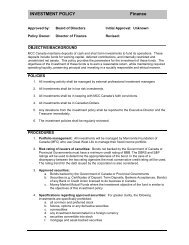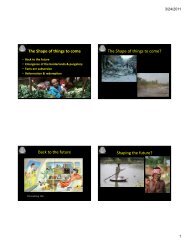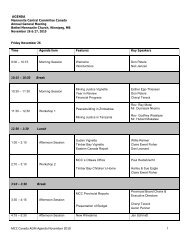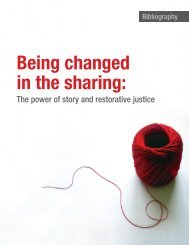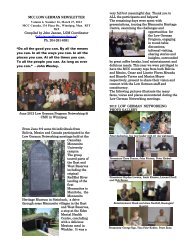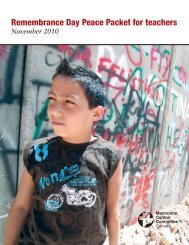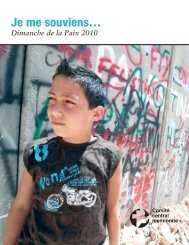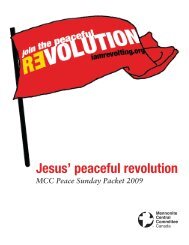Walking together: Healing and hope for Colombian refugees
Walking together: Healing and hope for Colombian refugees
Walking together: Healing and hope for Colombian refugees
Create successful ePaper yourself
Turn your PDF publications into a flip-book with our unique Google optimized e-Paper software.
84<br />
w a l k i n g<br />
t o g e t h e r<br />
integration. Nonetheless, if a refugee has turned to alcohol <strong>and</strong> drugs, it is likely because that option<br />
seemed helpful at the time.<br />
Another unhealthy coping strategy that is often employed by people who have experienced refugee<br />
trauma is that of intentional isolation. After being subjected to such painful experiences by other human<br />
beings, the ability to trust <strong>and</strong> to open up to social contact <strong>and</strong> new friendships can be challenging,<br />
leading some <strong>refugees</strong> to choose to isolate themselves. Clearly, isolation is problematic: it provides<br />
excess time to dwell on the past, limits chances <strong>for</strong> positive <strong>and</strong> healing interactions, <strong>and</strong> stunts the<br />
process of integration <strong>and</strong> reconstructing life. As a church, the way in which you walk with, befriend,<br />
include, encourage <strong>and</strong> guide the refugee family will make a world of difference, <strong>and</strong> will likely be all it<br />
takes to keep them from turning to unhealthy coping strategies such as these.<br />
REFUGEE TRAUMA & HEALING<br />
For more in<strong>for</strong>mation on refugee trauma <strong>and</strong> healing, the following are some useful resources:<br />
The Little Book of Trauma <strong>Healing</strong>: When Violence Strikes <strong>and</strong> Community is Threatened. Editors: Carolyn Yoder & Howard<br />
Zehr. This book, from the Little Books of Justice <strong>and</strong> Peacebuilding series, is easily read <strong>and</strong> an indispensable resource to have on h<strong>and</strong>.<br />
It should be available through your local MCC <strong>for</strong> borrowing.<br />
David Baldwin’s Trauma In<strong>for</strong>mation Pages. An award winning site with resources <strong>for</strong> people working with trauma survivors.<br />
http://www.trauma-pages.com.<br />
Sidran Institute: Traumatic Stress Education. Articles, links <strong>and</strong> tools <strong>for</strong> therapists, faith based caregivers, survivors <strong>and</strong><br />
loved ones. http://www.sidran.org.<br />
International Society <strong>for</strong> Traumatic Stress Studies. Trauma Resources section contains articles, fact sheets <strong>and</strong> videos about<br />
traumatic stress <strong>for</strong> caregivers <strong>and</strong> professionals. http://www.istss.org.<br />
Canadian Centre <strong>for</strong> Victims of Torture. Online <strong>and</strong> print resources on trauma, torture <strong>and</strong> accompanying survivors.<br />
http://www.ccvt.org.<br />
STAR toolkit from Eastern Mennonite University. Easily understood, printable resources <strong>for</strong> people who support trauma survivors.<br />
http://www.emu.edu/cjp/pti/star/toolkit/.<br />
The Center <strong>for</strong> Victims of Torture. The resources section has a series of excellent publications on refugee trauma healing.<br />
http://www.cvt.org/.<br />
Children’s Hospital Boston, Centre <strong>for</strong> Refugee Trauma <strong>and</strong> Resilience, Refugee Services Toolkit. A web-based tool<br />
designed to help caregivers underst<strong>and</strong> the experiences <strong>and</strong> needs of refugee children <strong>and</strong> families.<br />
http://www.chcrtr.org/toolkit/.<br />
Boston Center <strong>for</strong> Refugee Health <strong>and</strong> Human Rights. This site offers a free online course on caring <strong>for</strong> torture survivors.<br />
http://www.bcrhhr.org/.<br />
Stress <strong>and</strong> Trauma <strong>Healing</strong>: A Manual <strong>for</strong> Caregivers. Authors: Karl <strong>and</strong> Evelyn Bartsch. This excellent manual covers both<br />
the process by which victims become survivors <strong>and</strong> the process by which they themselves may become healers or caregivers<br />
<strong>for</strong> others. It is useful <strong>for</strong> faith based small group settings. Available through the Mennonite Church Resource Library (ID 8650) <strong>and</strong><br />
may be downloaded from the MCC Resources <strong>for</strong> Trauma <strong>Healing</strong> <strong>and</strong> Community Recovery website:<br />
http://healingtrauma.pdd.mcc.org/



